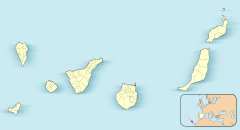 | |
| Part of | Teide Observatory |
|---|---|
| Location(s) | Tenerife, Atlantic Ocean, international waters |
| Coordinates | 28°18′06″N 16°30′39″W / 28.301797°N 16.510724°W / 28.301797; -16.510724 |
| Organization | Leibniz Institute for Astrophysics Potsdam Leibniz Institute for Solar Physics Max Planck Institute for Solar System Research |
| Wavelength | 350 nm (860 THz)–2,000 nm (150 THz) |
| First light | 12 March 2009 |
| Telescope style | Gregorian telescope solar telescope |
| Diameter | 1.5 m (4 ft 11 in) |
| Angular resolution | 0.08 arcsecond |
| Focal length | 55.6 m (182 ft 5 in) |
| Enclosure | dome |
| Website | www |
 | |
| [REDACTED] Related media on Commons | |
| [edit on Wikidata] | |
GREGOR is a solar telescope, equipped with a 1.5 m primary mirror, located at 2,390 m altitude at the Teide Observatory on Tenerife in the Canary Islands. It replaces the older Gregory Coudé Telescope and was inaugurated on May 21, 2012. First light, using a 1 metre test mirror, was on March 12, 2009 (2009-03-12).
GREGOR is the third-largest solar telescope in the world, after the Big Bear Observatory and the McMath-Pierce solar telescope. It is aimed at observing the solar photosphere and chromosphere at visible and infrared wavelengths. GREGOR sports a high-order adaptive optics (AO) system with a 256-actuator deformable mirrors and a 156-subaperture Shack-Hartmann wavefront sensor. Efforts are underway to implement multi-conjugate AO in 2014.
2014-2020
| This section is empty. You can help by adding to it. (September 2020) |
2020 upgrade
Initial astigmatism was fixed during an upgrade with some corrective optics: two off-axis parabolic mirrors.
See also
- Vacuum Tower Telescope – Solar telescope on Tenerife operated by KIS
- Swedish Solar Telescope – Telescope on La Plama, Canary Islands
- Dutch Open Telescope
- Roque de los Muchachos Observatory – Spanish astronomical observatoryPages displaying wikidata descriptions as a fallback
- List of solar telescopes
References
- "Präziser Blick in die Sonne dank temperaturstabiler Glaskeramik". 2012-05-30. Archived from the original on 2019-03-29. Retrieved 2016-04-14.
- "GREGOR Telescope". KIS website. Kiepenheuer-Institut für Sonnenphysik. Retrieved 11 January 2014.
- "GREGOR". IAC website. Instituto de Astrofísica de Canarias. Retrieved 11 January 2014.
- First light was obtained with a 1-meter test-mirror due to manufacturing issues with the main mirror
- "GREGOR telescope: Zooming in on the sun". phys.org website. phys.org. May 10, 2012. Retrieved 11 January 2014.
- "GREGOR Optical Design". KIS website. Kiepenheuer-Institut für Sonnenphysik. Retrieved 11 January 2014.
- Europe's largest Solar Telescope GREGOR unveils magnetic details of the Sun Sept 2020
Sources
- "GREGOR - A New Telescope for Solar Physics". AIP website. Leibniz Institute for Astrophysics Potsdam. Retrieved 11 January 2014.
This telescope-related article is a stub. You can help Misplaced Pages by expanding it. |
This article related to the Sun is a stub. You can help Misplaced Pages by expanding it. |